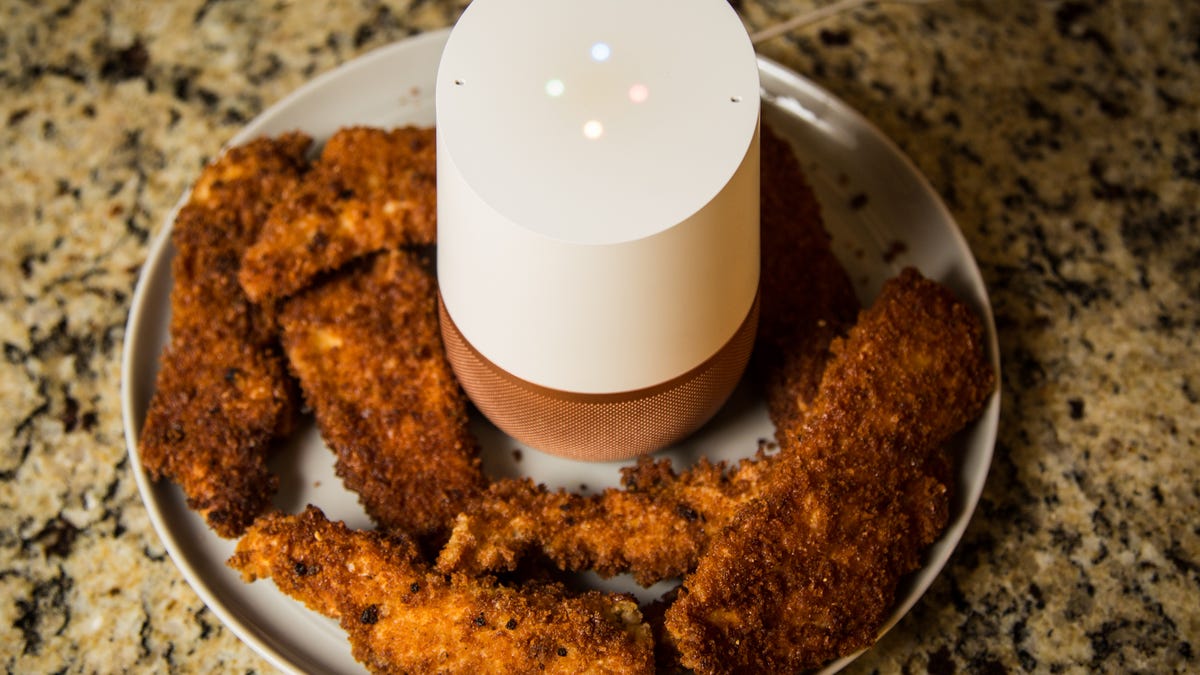Google Home and Assistant one year later: What now?
Does the search giant have enough firepower to overtake Amazon? We'll find out this week at Google I/O.
A few days before Google CEO Sundar Pichai stepped on stage at the 2016 I/O developer conference, he told me about the Assistant, a digital helper that could do things for you like play a song, give you flight information or tell you what's on your calendar.
Pichai also gave credit where credit was due. One of the devices the Assistant would inhabit is Google Home, a smart speaker that aims to capitalize on the success of the Amazon Echo.
"There are areas where we will be ahead," Pichai said of following Amazon to the market. "And there will be areas where someone points a way and we do it."
On Wednesday, Pichai returns to Shoreline Amphitheater -- basically Google's backyard in Mountain View, California -- almost a year after introducing the world to the Assistant and Google Home. He's expected to talk about a range of things including virtual reality and Android, Google's mobile operating system at Google I/O.
And he's also due to give us an update on the Assistant, a rival to Amazon's Alexa voice assistant, Apple's Siri and Microsoft's Cortana.
It might not make any difference to you whether you're barking orders at a device made by Google or Amazon, just as long as it gives you an accurate weather report or reads out the top headlines of the hour. But the stakes are high for tech companies looking to take over your living room. Home is where you binge on TV and movies, get ready for work, eat, cook, sleep and shop online. All of that activity is potentially data that tech giants including Google and Amazon want to get their hands on. The better they know you, the more they'll (eventually) be able to woo advertisers or get you to buy things.
It's not like we don't have any options. Right now, Google is a distant second in the smart speaker market. So far, people overwhelmingly have picked the Amazon Echo, introduced in 2014, as the smart home hub of choice, according to research firm eMarketer. In the US, of the 35.6 million people who use a voice-enabled speaker once a month, more than 70 percent use a product from the Echo line, which has several variations, including the $150 original Echo and $50 Echo Dot. Google Home, which right now sells for $115, has almost 24 percent.
Google declined to comment. An Amazon spokeswoman said it's "great to see people excited" about smart home hubs.
'Pressure on Google'
Competition is only going to get more fierce. Last week, Amazon introduced its latest Echo product, the $230 Echo Show, which includes a screen for video calling. Microsoft is also bringing its Cortana digital assistant software to smart speakers, partnering with manufacturers including Samsung's Harman Kardon, Intel and HP.
That means for Google, the clock is ticking. Once people bring a smart speaker like the Echo into their house, they're unlikely to switch to a competitor, according to a study by VoiceLabs. Only 11 percent would consider making that jump.
"It does put a certain amount of pressure on Google," said Victoria Petrock, a principal analyst at eMarketer. "Amazon came out very early and aggressively."
But she and other analysts think Google has a good shot at pulling ahead of Amazon. That's because while Alexa, the digital assistant that powers the Echo, is an unexpected hit, Google may have a formidable edge -- the trove of data that comes with 18 years of being a search company.
Think about everything you confide to Google: your emails (Gmail), your whereabouts and favorite hangouts (Maps), your work schedule (Calendar), your love of Steph Curry highlights (YouTube), your favorite recipes (Search), your weird fascination with anglerfish (Search, again), or your obsession with World War I trivia (Search is really powerful).
If Google leverages all that personal data the right way, Home could offer a better experience than the Echo. (CNET Reviews -- independent from its news department -- last month gave the nod to Home, after previously going with the Echo.)
"Google has some natural advantages because of the information people are willing to share with them," said Frank Gillett, an analyst at Forrester Research. And Google also has the software chops to pull it off. "It's a whole level of invisible engineering a lot of us don't appreciate," he said.
Last month, Google announced multiaccount support for the assistant. That means Home can recognize more than one voice and surface personal information, preferences, calendar items and other stuff based on who's talking. On a conference call earlier this month, Pichai called the feature a "game-changer."
We'll see if it is. eMarketer's Petrock calls it "a very important step."
At this week's Google I/O (last year's event drew 7,000 developers), we'll hear what Pichai's next steps are -- and if they're strides, jumps or stumbles.
Virtual reality 101: CNET tells you everything you need to know about VR.
Tech Enabled: CNET chronicles tech's role in providing new kinds of accessibility.


